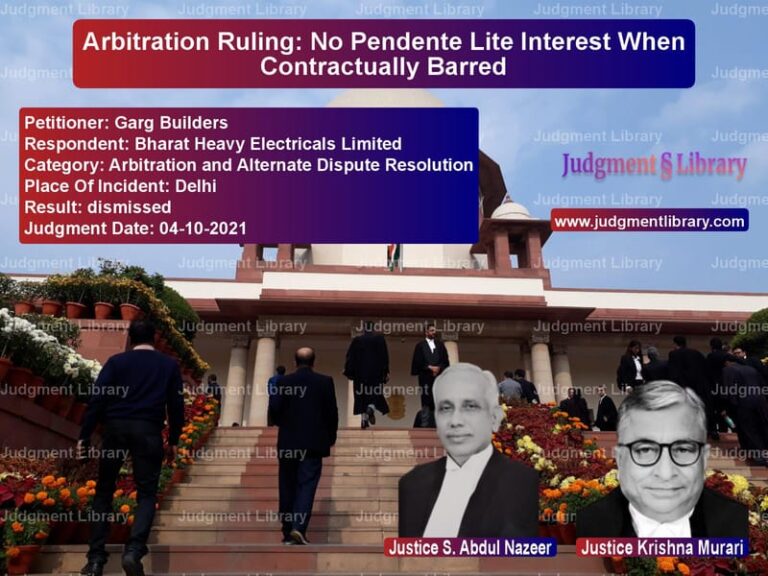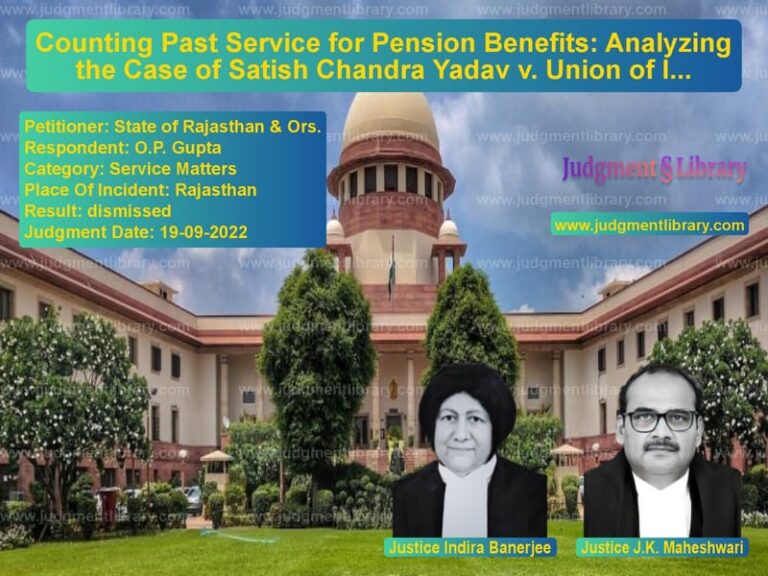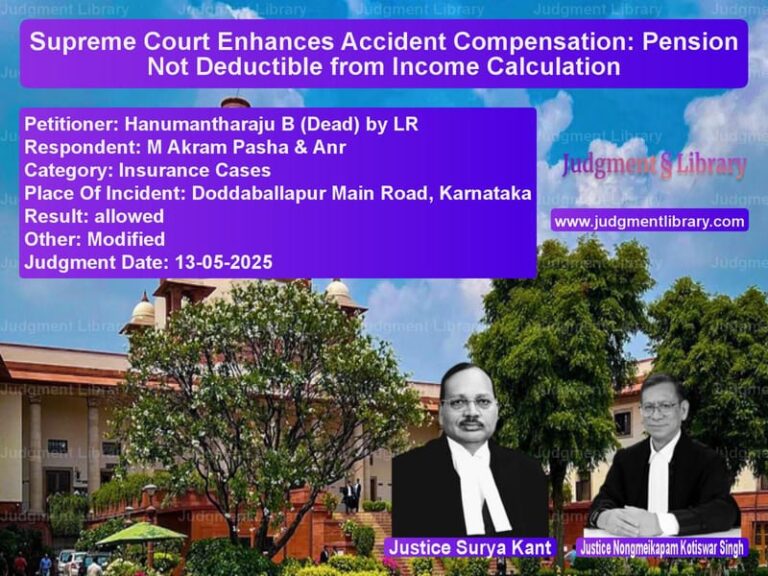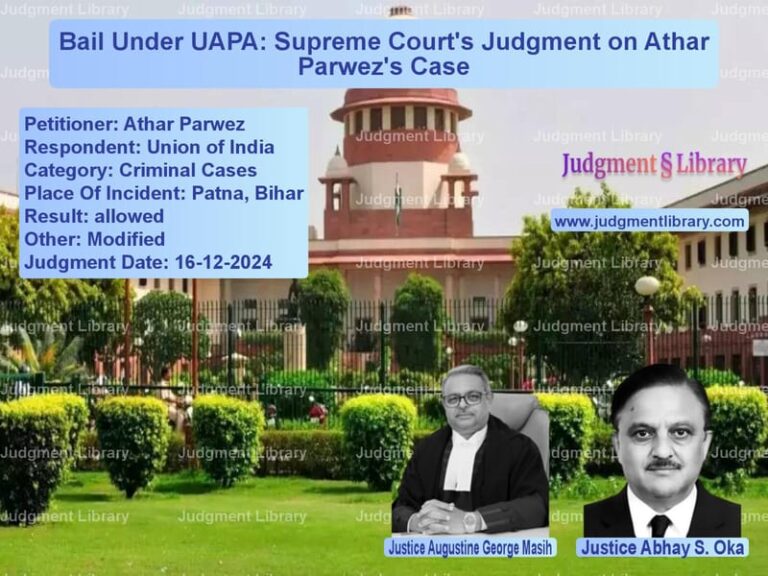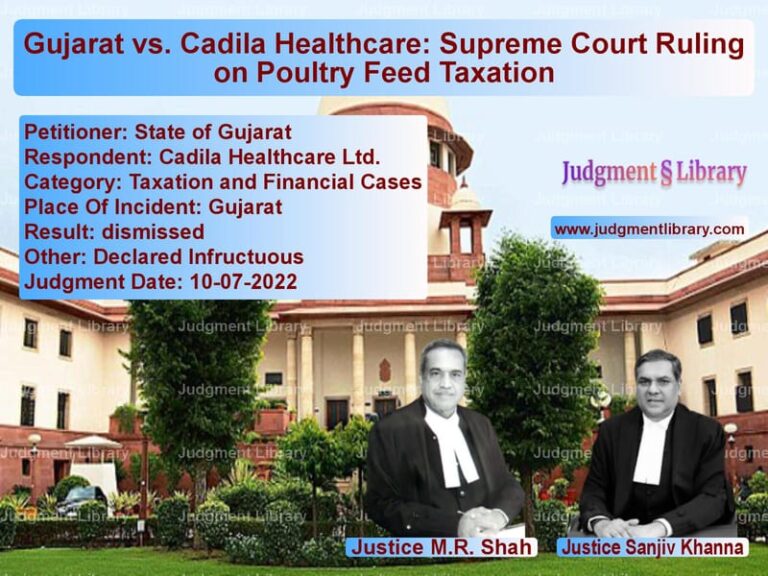Supreme Court Quashes Cheating Case Against Company Director: Comprehensive Analysis of Vicarious Liability and Res Judicata Principles
In a landmark judgment delivered on April 16, 2025, the Supreme Court of India in S.C. Garg vs State of Uttar Pradesh & Anr. (Criminal Appeal No. 438 of 2018) settled crucial legal questions regarding the prosecution of company directors, applicability of res judicata in criminal matters, and the prerequisites for establishing vicarious liability. The judgment, authored by Justice Prashant Kumar Mishra with Justice Pankaj Mithal concurring, provides exhaustive analysis of these complex legal issues while quashing criminal proceedings against a company managing director.
Detailed Background of the Case
The dispute originated from business transactions between Ruchira Papers Ltd. (represented by its Managing Director S.C. Garg) and ID Packaging (a partnership firm of R.N. Tyagi). The factual matrix reveals:
1. Between December 22, 1997 to January 30, 1998, Tyagi issued 11 cheques to Ruchira Papers which were initially dishonored due to insufficient funds.
2. Parties agreed to represent these cheques later, with only 4 being honored on second presentation.
3. Ruchira Papers initiated proceedings under Section 138 of the Negotiable Instruments Act for the remaining 7 dishonored cheques.
4. During these proceedings, Tyagi’s defense that the liability was cleared through separate demand drafts was rejected by courts at three levels – Trial Court (conviction order dated 25.10.2002), Sessions Court (appeal dismissal on 17.03.2005), and High Court (compromise order dated 10.10.2012).
5. Simultaneously, Tyagi had registered FIR No. 549 of 1998 alleging that Garg fraudulently encashed 4 cheques despite receiving payment through demand drafts.
6. The current appeal challenged the High Court’s refusal to quash these cheating charges under Section 482 CrPC.
Petitioner’s Detailed Submissions
Senior Advocate Mr. Siddharth Aggarwal, representing appellant Garg, advanced multi-pronged arguments:
“The impugned prosecution has been instituted as a counterblast to the concluded proceedings under Section 138 of the NI Act in which Tyagi was convicted and it eventually concluded by way of compromise before the High Court.”
His detailed contentions included:
1. Res Judicata Application: The exact defense of payment through demand drafts was raised and conclusively rejected in NI Act proceedings. The judgment quoted Trial Court’s finding:
“From this statement of account Ex.P-16, it can be safely presumed that these demand drafts pertaining to some other liability of the accused persons and these demand drafts were not issued to liquidate the liability of impugned cheques.”
Read also: https://judgmentlibrary.com/supreme-court-revives-fraud-case-against-kia-parts-manufacturers-cfo/
2. Corporate Prosecution Defects: Emphasized that the company wasn’t made an accused, relying on Aneeta Hada judgment:
“When a company has not been arrayed as a party, no proceeding can be initiated against it even where vicarious liability is fastened under certain statutes.”
3. Lack of Specific Allegations: Highlighted absence of personal allegations against Garg beyond his official capacity.
4. Non-Application of Judicial Mind: Criticized the summoning order as mechanical without proper reasoning.
Respondent’s Comprehensive Counter-Arguments
Advocate Mr. Vikas Bansal, representing the State and complainant Tyagi, countered:
“It is a subject matter of trial as to whether Garg encashed the amount involved in 04 cheques despite having received the amount by way of demand drafts separately given to him by Tyagi after all the cheques were dishonoured on the first occasion.”
His key submissions were:
1. Factual Dispute: Maintained that whether demand drafts covered the cheque liabilities requires trial examination.
2. Double Payment Theory: Alleged Garg obtained payment twice – through cleared cheques and demand drafts.
3. Maintainability: Argued previous NI Act proceedings didn’t preclude fresh prosecution for distinct offence of cheating.
4. Corporate Liability: Contended director could be prosecuted separately from company for personal acts.
Court’s Exhaustive Analysis and Reasoning
The 28-page judgment contains meticulous legal analysis spread across multiple sections:
1. Res Judicata in Criminal Proceedings (Paras 10-20)
The Court undertook comprehensive review of precedent from Sambasivam (1950) to recent cases, observing:
“Reading three earlier decisions vis-à-vis the two later decisions parallelly, we do not think that considering the context and the stage of the proceedings in which the matters stood and agitated before this Court, there is any diversion in the applicability of the principle of res judicata.”
It distinguished between cases with final adjudication (where res judicata applies) and preliminary proceedings (where it may not), ultimately holding:
“Pritam Singh (supra) is binding insofar as the issue concerning the applicability of principle of res judicata in a criminal proceeding is concerned.”
2. Vicarious Liability Principles (Paras 21-25)
The judgment extensively discussed corporate criminal liability through landmark cases:
“When the company has not been arraigned as an accused, such an order could not have been passed… the High Court should have been well advised to quash the criminal proceedings.” (quoting Sharad Kumar Sanghi)
It reiterated the Aneeta Hada ratio that company must typically be prosecuted before its officials.
3. Specific Allegation Requirement (Paras 26-27)
Relying on Delhi Race Club, the Court emphasized:
“The office bearers could be arrayed as accused only if direct allegations are levelled against them… The complainant has to demonstrate that he has been cheated on account of criminal breach of trust or cheating or deception practised by the office-bearers.”
4. Judicial Scrutiny of FIRs (Para 28)
Quoting Iqbal @ Bala, the Bench underscored courts’ duty:
“The court owes a duty to look into the FIR with care and a little more closely… try to read in between the lines.”
Comprehensive Conclusion and Impact
The judgment makes several seminal contributions to jurisprudence:
1. Res Judicata Clarification: Resolves apparent conflict in precedents by holding principle applies to criminal matters with final adjudication.
2. Corporate Prosecution Protocol: Reaffirms Aneeta Hada mandate that company must ordinarily be arraigned before its officials.
3. Directorial Liability Standards: Sets high threshold for prosecuting individuals in corporate cases – requiring specific allegations.
4. Judicial Scrutiny: Emphasizes magistrates’ duty to apply careful scrutiny before summoning accused.
The Court ultimately allowed the appeal and quashed the criminal proceedings, observing:
“For all the aforestated reasons, we unhesitatingly conclude that the present is a fit case for allowing the appeal to quash the impugned criminal proceedings instituted against the appellant for offences under Section 420 of the IPC.”
This judgment significantly impacts corporate litigation by providing robust safeguards against frivolous prosecutions of company officials while maintaining avenues for genuine cases of corporate fraud.
Petitioner Name: S.C. Garg.Respondent Name: State of Uttar Pradesh & Anr..Judgment By: Justice Pankaj Mithal, Justice Prashant Kumar Mishra.Place Of Incident: Ghaziabad, Uttar Pradesh.Judgment Date: 15-04-2025.Result: allowed.
Don’t miss out on the full details! Download the complete judgment in PDF format below and gain valuable insights instantly!
Download Judgment: s.c.-garg-vs-state-of-uttar-prade-supreme-court-of-india-judgment-dated-15-04-2025.pdf
Directly Download Judgment: Directly download this Judgment
See all petitions in Fraud and Forgery
See all petitions in Cheque Dishonour Cases
See all petitions in Corporate Governance
See all petitions in Company Law
See all petitions in Bail and Anticipatory Bail
See all petitions in Judgment by Pankaj Mithal
See all petitions in Judgment by Prashant Kumar Mishra
See all petitions in allowed
See all petitions in Quashed
See all petitions in supreme court of India judgments April 2025
See all petitions in 2025 judgments
See all posts in Criminal Cases Category
See all allowed petitions in Criminal Cases Category
See all Dismissed petitions in Criminal Cases Category
See all partially allowed petitions in Criminal Cases Category


